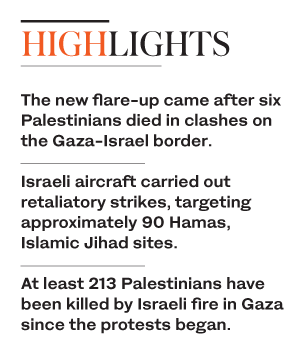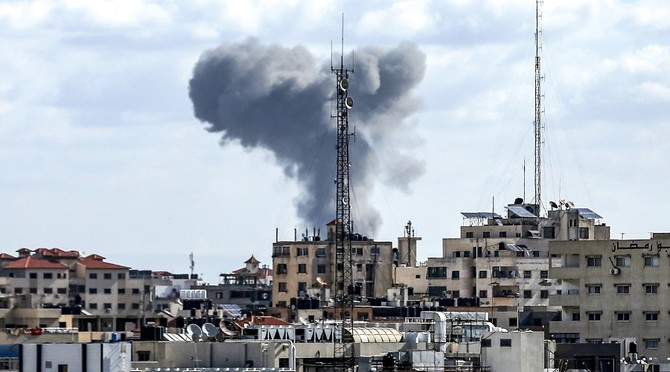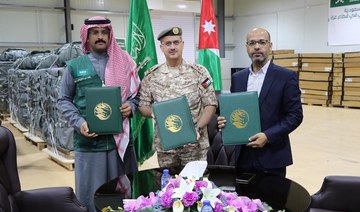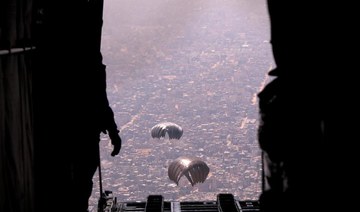GAZA CITY, Palestinian Territories: The Israeli army accused the Syrian government on Saturday of ordering Palestinian militants in Gaza supported by Iran to fire dozens of rockets into southern Israel, and threatened to retaliate wherever it chose.
The barrage of rockets, which began late Friday and continued into Saturday, triggered extensive retaliatory strikes by Israeli aircraft against Gaza that risked escalating into a wider conflict.
The new flare-up came hours after six Palestinians died in renewed clashes on the Gaza-Israel border even as the territory's Islamist rulers Hamas said Egypt was seeking to negotiate a return to calm.
“The rockets that were launched against Israel... we know that the orders, incentives were given from Damascus with the clear involvement of the Iranian Revolutionary Guards' Quds Force,” army spokesman Lieutenant Colonel Jonathan Conricus said, referring to the Guards' foreign operations unit.
At least 39 rockets have been fired at southern Israel by the Islamic Jihad group since late Friday, with 17 of them intercepted by air defences and the rest hitting open ground, the army said.
Israeli aircraft carried out extensive retaliatory strikes, targeting approximately 90 sites belonging to the territory's Islamist rulers Hamas.
Conricus said that Israel held Hamas responsible for the fire, even though it was carried out by Islamic Jihad at the behest of Syria and its ally Iran.
“We hold Hamas responsible for everything coming from Gaza,” he said.
Conricus said Israel would also retaliate against the Syrian government and Iran's Quds Force, and would choose where.
“Part of the address by which we will deal with this fire is also in Damascus and the Quds Force,” he said. “Our response is not limited geographically.”
The biggest rocket barrage from Gaza in months came despite talk of progress towards an Egyptian-brokered deal to end months of often violent protests along the border in return for an easing of Israel's crippling 11-year blockade.
On Sunday, Israel reopened the people and goods border crossings with Gaza and on Wednesday renewed the flow of Qatar-funded fuel to the Palestinian enclave, in an indication of its confidence that Hamas would rein in violence.
The Friday border marches however drew 16,000 protesters, some of them clashing with Israeli soldiers.
Five Palestinians were shot dead by Israeli fire in separate incidents along the border fence, the Gaza health ministry said.
A sixth died when a hand grenade he was holding exploded accidentally, witnesses said.
There were no reports of casualties in Gaza as a result of the Israeli air strikes, which began late Friday and continued on Saturday.
In Gaza City, a four-storey building was completely destroyed in a strike, AFP correspondents reported.
The Israeli army said it was a major headquarters of Hamas.
Israel has fought three wars since 2008 with Hamas and its allies, including Islamic Jihad, and Egypt and the United Nations have been leading diplomatic efforts to avert a fourth.
The armed wing of Islamic Jihad, the second largest militant group in Gaza, threatened to continue the rocket fire on Saturday.
The “resistance is considering expanding the response in number and type, if the enemy continues its aggression against our people,” it said.
Israel has struck Syria dozens of times in recent years, saying it is preventing Iran from supplying advanced weapons to enemies of the Jewish state.
US President Donald Trump's peace envoy Jason Greenblatt condemned the rocket fire.
“More rockets from Gaza into Israel. Another night where parents are ushering terrified children to cover. Violence will not build futures for anyone,” he said on Twitter.
Palestinians have gathered for protests along the border at least weekly since March 30.
At least 213 Palestinians have been killed by Israeli fire in Gaza since the protests began, according to figures collated by AFP.
The majority have died during protests, while smaller numbers have been killed by air strikes or tank fire.
One Israeli soldier was shot dead by a Palestinian sniper over the same period.
The protesters are calling to be allowed to return to lands their families fled or were expelled from in the 1948 war that accompanied Israel's creation.
They are also protesting over Israel's crippling blockade.
Reports Friday suggested a deal had been reached that would see the protests end in exchange for an easing of the blockade.
Hamas officials denied any had been reached but confirmed to AFP that progress was being made.
Israel says its blockade is necessary to isolate Hamas, while critics say it amounts to collective punishment of Gaza's two million residents.
Israel accuses Syria, Iran of orchestrating Gaza rocket fire
Israel accuses Syria, Iran of orchestrating Gaza rocket fire

- At least 39 rockets have been fired at southern Israel by the Islamic Jihad group since late Friday
- On Friday, six Palestinians died in renewed clashes on the Gaza-Israel border
Biden adviser will be in Israel on Monday to avoid escalation between Israel, Lebanon

WASHINGTON: A senior Biden adviser will travel to Israel on Monday for meetings to avoid further escalation between Israel and Lebanon, a White House official said.
Amos Hochstein will advance efforts to avoid further escalation along the “Blue Line” between Israel and Lebanon, said the official, who did not wish to be identified.
Attacks between Israel and Iran-backed Hezbollah militants in Lebanon have led to worries of a deeper war across the Middle East.
Israel warns of escalation from cross-border fire from Hezbollah

- Hezbollah says it will not halt fire unless Israel stops its military offensive on Gaza
JERUSALEM: Intensified cross-border fire from Lebanon’s Hezbollah movement into Israel could trigger serious escalation, the Israeli military said on Sunday.
“Hezbollah’s increasing aggression is bringing us to the brink of what could be a wider escalation, one that could have devastating consequences for Lebanon and the entire region,” Israeli military spokesperson Rear Admiral Daniel Hagari said in a video statement in English.
Iran-backed Hezbollah last week launched the largest volleys of rockets and drones yet in the eight months it has been exchanging fire with the Israeli military, in parallel with the Gaza war.
After the relatively heavy exchanges over the past week, Sunday saw a marked drop in Hezbollah fire, while the Israeli military said that it had carried out several air strikes against the group in southern Lebanon.
The US and France are working on a negotiated settlement to the hostilities along Lebanon’s southern border. Hezbollah says it will not halt fire unless Israel stops its military offensive on Gaza.
“Israel will take the necessary measures to protect its civilians — until security along our border with Lebanon is restored,” Hagari said.
‘No joy’: Gazans mark somber Eid in shadow of war

- Many Palestinians forced to spend holiday without their loved ones
- I hope the world will put pressure to end the war on us because we are truly dying, and our children are broken
GAZA STRIP: In tents in the stifling heat and bombed-out mosques, Gazans on Sunday marked the start of the Eid Al-Adha holiday, devoid of the usual cheer as the Israel-Hamas war raged on.
“There is no joy. We have been robbed of it,” said Malakiya Salman, a 57-year-old displaced woman now living in a tent in Khan Younis City in the southern Gaza Strip.
Gazans, like Muslims the world over, would usually slaughter sheep for the holiday — whose Arabic name means “feast of the sacrifice” — and share the meat with the needy.
Parents would also give their children new clothes and money for the celebration.
But this year, after more than eight months of a devastating Israeli campaign that has flattened much of Gaza, displaced most of the besieged territory’s 2.4 million people, and sparked repeated warnings of famine, the Eid is a day of misery for many.
“I hope the world will put pressure to end the war on us because we are truly dying, and our children are broken,” said Salman.
Her family was displaced from the far-southern city of Rafah, a recent focus of the fighting which began after Hamas’s Oct. 7 attack on southern Israel.
The military on Sunday morning announced a “tactical pause of military activity” around a Rafah-area route to facilitate the delivery of desperately needed humanitarian aid to Gazans.
AFP correspondents said there were no reports of strikes or shelling since dawn, though the Israeli military stressed there was “no cessation of hostilities in the southern Gaza Strip.”
The brief respite in fighting allowed worshippers a rare moment of calm on holiday.
Many gathered for the Eid Al-Adha morning prayer in the courtyard of Gaza City’s historic Omari Mosque, which was heavily damaged in Israeli bombardment, placing down their frayed prayer mats next to mounds of rubble.
The sound of prayers traveled down some of the city’s destroyed and abandoned streets.
“Since this morning, we’ve felt a sudden calm with no gunfire or bombings ... It’s strange,” said 30-year-old Haitham Al-Ghura from Gaza City.
He hoped the pause meant a permanent ceasefire was near, though truce mediation efforts have stalled for months.
In several areas of the war-battered territory, especially in Gaza City, young boys were seen manning roadside shops selling perfumes, lotions, and other items against the backdrop of piles of rubble from destroyed buildings and homes.
Many vendors used umbrellas to protect themselves from the scorching sun as they sold household items on Gaza City’s main market street. But there were few buyers.
Food and other goods can reach four or five times their usual price, but those who cling to the holiday traditions can still afford them.
In Khan Younis, displaced man Majdi Abdul Raouf spent 4,500 shekels ($1,200) — a small fortune for most Gazans — on a sheep to sacrifice.
“I was determined to buy it despite the high prices, to perform these rituals and bring some joy and happiness to the children in the displacement camp,” said the 60-year-old, who fled his home in Rafah.
“There is sadness, severe pain, and suffering, but I insisted on having a different kind of day.”
The deadliest-ever Gaza war began after Hamas’s unprecedented Oct. 7 attack.
Israel’s retaliatory offensive has killed at least 37,337 people in Gaza, also mostly civilians, according to the Health Ministry in the territory.
For many, a halt in fighting can never bring back what has been lost.
“We’ve lost many people, there’s a lot of destruction,” said Umm Mohammed Al-Katri from Jabalia refugee camp in northern Gaza.
“This Eid is completely different,” she said, with many Gazans forced to spend the holiday without their loved ones killed or displaced during the war.
Grieving families on Sunday flocked to cemeteries and other makeshift burial sites, where wooden planks marked the graves.
“I feel comfort here,” said Khalil Diab Essbiah at the cemetery where his two children are buried.
Even with the constant buzzing of Israeli drones overhead, visitors at the cemetery “can feel relieved of the genocide we are in and the death and destruction,” he said.
Hanaa Abu Jazar, 11, also displaced from Rafah to the tent city in Khan Yunis, said: “We see the (Israeli) occupation killing children, women and the elderly.”
“How can we celebrate?” asked the girl.
Jordan conducts three airdrops in southern Gaza

- Aid packages containing food, clothing, and sweets were delivered to various locations in the southern Gaza
AMMAN: Jordan’s armed forces conducted three airdrops to the southern part of Gaza on Sunday, in collaboration with Egypt, to mark the first day of Eid Al-Adha, Jordan News Agency reported.
Aid packages containing food, clothing, and sweets were delivered to various locations in the southern Gaza Strip by two planes from the Royal Jordanian Air Force and an aircraft from Egypt.
Earlier on Saturday, a 45-truck humanitarian aid convoy arrived in Gaza, sent by the JAF and the Jordan Hashemite Charity Organization (JHCO).
In cooperation with its regional and international allies, the Jordanian armed forces have carried out 261 airdrops and delivered 1,970 trucks of aid since the beginning of Israel’s onslaught on Gaza.
WHO chief Tedros Adhanom Ghebreyesus said that “a significant proportion of Gaza’s population is now facing catastrophic hunger and famine-like conditions,” as Israel continues to impose severe restrictions on the supply of food, water, medicine, and fuel to the Strip.
Kuwait Red Crescent distributes meat to Lebanese families, Syrian, Palestinian refugees

- Initiative follows last week's distribution of Eid Al-Adha packages by the KRCS
LONDON: The Kuwait Red Crescent Society (KRCS) has launched an initiative to distribute meat to around 1,500 Lebanese families, as well as Syrian and Palestinian refugees in Lebanon, in celebration of Eid Al-Adha, Kuwait News Agency reported on Sunday.
Youssef Boutros, relief coordinator of the Lebanese Red Cross (LRC), announced that the distribution process had begun on Sunday.
This initiative follows last week's distribution of Eid Al-Adha packages by the KRCS, which included clothes and other essentials for around 2,000 families, covering Lebanese families and Syrian and Palestinian refugees.
In addition to these efforts, the KRCS is continuing its humanitarian aid to 6,000 Lebanese families in southern Lebanon, who have been affected by military confrontations between Hezbollah and Israel since October.
This aid, which includes food and staple supplies, is being distributed with the assistance of the LRC.























